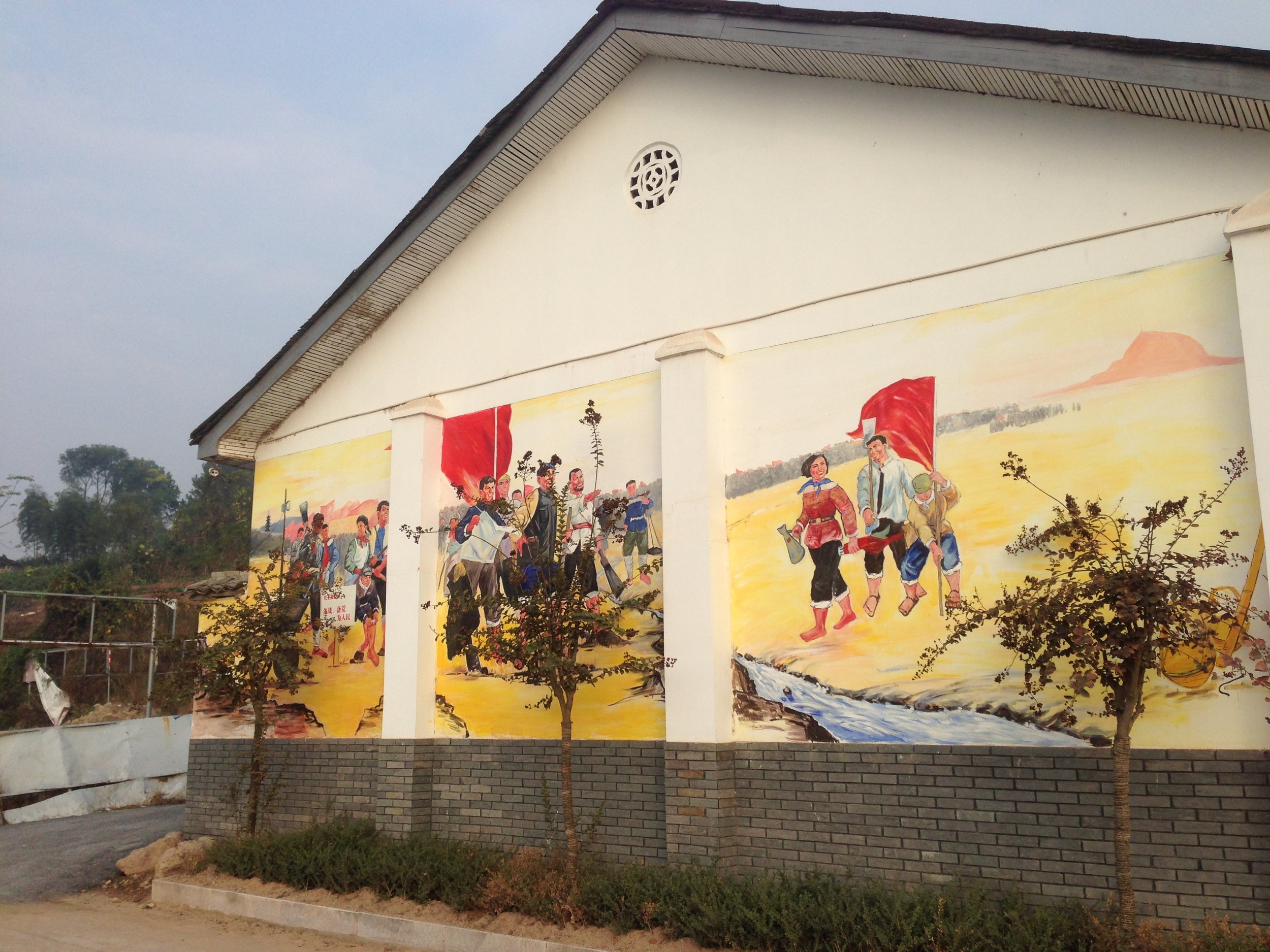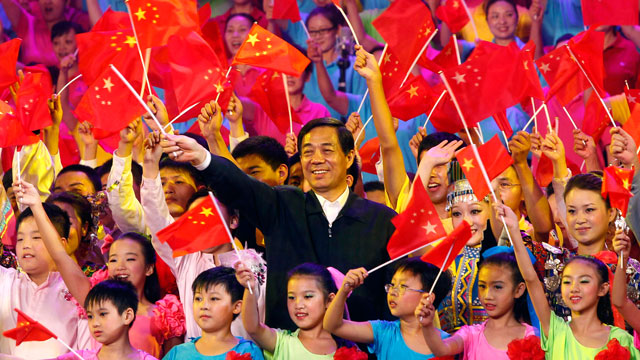China's red turn?
China's call for artists to visit the countryside should be viewed in light of recent political upheaval, not the Cultural Revolution.
On a recent trip to rural Zhejiang to look at historic village preservation efforts , I found myself staying in an interesting hotel, evocatively named the 知青公社 or "Intellectual Youth Commune" in Songyang County. Of course, this hotel was anything but a commune. It's a posh destination for visiting urban tourists, especially given the county's mostly rural character. But the name is in reference to the "sent down youth" of China's 1950's to 1970s. Mao advocated that young urban dwellers be sent down to China's villages to learn from the masses and do volunteer work. It is this same movement with which people are now now comparing recent Chinese government announcements of a program to send artists to the countryside to form, "correct views of art."
There has been much in the foreign press about this new "red turn" back to the era of Mao, in which the party takes a more direct and hardline view towards culture and art. In 1942 Mao Zedong made his famous Yan'an speech calling for artist to aid in the establishment of a people's dictatorship. Xi Jinping several months ago made headlines when he spoke to a conference of artists urging them not to "be slaves to the market" and called for an end to "weird architecture." For many, this seemed like the beginnings of a return to a time when China's CCP took a direct interest in controlling arts and the media after a period of several decades during which China's arts have mostly thrived with a government concerned only that art not directly criticize the government. Any visitor to Beijing's 798 will seem to get the impression that China has fully opened itself to modern and avante-garde art. But this announcement seemed to be so wildly anachronistic.
However, it would be wise to consider these new calls for conservatism in art in the context of more recent political events: the ousting of Bo Xilai and his so-called "Chongqing Model" of a more powerful state control in the economy and society. Just a few days ago, it was announced that Zhou Yongkang, once an avid ally and supporter of Bo, was to be kicked out of the party and tried for corruption. This is the first time a current or former member of the ruling Politburo committee has been tried on criminal charges of corruption. But China is not (at least not yet) heading back to the Maoist period. Just as new calls for conservatism in arts were announced, Xi has been pushing ahead with pilot free trade zones, visa and climate agreements with the U.S. and other economic reforms to strengthen the market's role in the economy. These recent "red culture" homages are just that: an attempt to appropriate some of the political symbolism of China's "new left"even as its former representatives remain behind bars and utterly defeated.
Bo Xilai's "Chongqing Model"
Bo Xilai was removed from his position as Party Chief of Chongqing after allegations surfaced that he was involved not only in corruption, but also in the murder of a British businessman at the behest of his wife, Gu Kailai. The complexity of the case doesn't need to be rehashed here, but the larger political significance of Bo's removal was that a political alternative to liberal economic reform policies favored by then Premier Wen Jiabao and other pro-free market politicians was effectively stripped of its legitimacy. Bo had become hugely popular in Chongqing, not just for cracking down on organized crime, but also for Socialist-ish policies that built affordable housing in the city. But Bo was flamboyant and unorthodox in some ways: he organized a campaign to sing "red songs" and even had the city send out patriotic "red texts" to citizens on their cell phones. His open moves to ascend to the highest levels of leadership were a challenge to the ruling guard and some even speculated he was organizing a coup.
This kind of superficial "red nostalgia" belied a more concrete alternative to the direction in which mainstream Chinese politics was moving. Therefore, Bo's removal dealt a huge blow to the so-called "New Left" in Chinese politics, those who were growing increasingly concerned over China's growing income inequality and entrenched rural poverty. Of course, many may have questioned Bo's true "red spirit" as his son attracted notoriety as a poor student and heavy partier while attending school at both Oxford and Harvard.
So where does Xi fit in?
Before Xi ascended to China's top position, many thought he was going to be the reformer who finally tackled the growing inequalities and entrenched power interests in China that had gone unaddressed in the Hu-Wen years. Indeed, his history as the son of one of the more moderate early CCP leaders, Xi Zhongxun, as well as his time spent in government posts in the relatively free-market and open coastal provinces of Fujian and Zhejiang, led many Western observers to believe that Xi was really a liberal in a Communist prince's clothing.
Xi has indeed followed most of the predictions about future directions of government economic reform. His right hand Premier, Li Keqiang, has served as a kind of global economics and trade minister, conveying the more global, financially astute side of China. Xi, however, has played a more domestically oriented role. He has consolidated power and gained attention for his brash and assertive "China Dream" slogan, as well as the crackdown on liberal voices in media and culture.
This kind of turn shouldn't have been unexpected. It is a similar kind of move that we see in American politics as well: moving to the center to occupy space vacated by political rivals. With Bo Xilai and his new left supporters vanquished, including Zhou Yongkang, who has been investigated for corruption, there is virtually no one else left to channel the political impulses that gave rise to the so-called New left. Zhou had even openly endorsed Bo's "red songs' campaign in Chongqing. But with this "clique" gone, Xi Jinping has been forced to take over some of those "new left" policies. Or rather, he has deftly appropriated the superficial rhetoric and symbols of those sentiments while pushing unabashedly ahead in the economic reform department.
Style or substance?
"The more interesting question is: Will China begin to invest in the future of rural communities?"
Viewed in this light, the recent call for a return of artists to the countryside makes perfect sense. As do his calls for architects to eschew "weird buildings". It is all part of a campaign of cultural conservatism and orthodoxy that harkens back to some of the programs of the Maoist period, but more immediately recalls some of the "red songs" policy of Bo Xilai's Chongqing. Underlying some of the seemingly silly call for artists to return to the countryside lies real and growing concern in China that materialism is rampant and pervasive in contemporary culture. There is growing concern, even among the urban elite and party mainstream, that China needs to pay more attention to its villages. The cultural programs Xi has called for are a convenient way to signal that the government intends to address the concerns of some who might otherwise have fallen into the camp of the "Chongqing model". In reality, the Chongqing Model, if it ever even was such a thing, is more or less dead. Market-based reforms and privatization lie on the economic horizon. But the social antagonisms that China's hurried embrace of capitalism have produced have not abated. Therefore we should expect to see more of these kinds of policies that may appear backwards to outside observers but are aimed mostly at a domestic audience.
Still, I think it would be flawed to view these programs as a return to the Maoist period. What it appears like to me is a kind of "writers in residence" program. If I was a writer in China and was offered a free trip to the countryside, I might consider taking it myself. I'd probably get nice banquets out of it, in any case. The real, more interesting question is whether the government will begin to address the future of the Chinese countryside with policies that recognize the need to support an alternative to merely relocating millions of people to cities by fiat. If there are no villages left besides the occasional tourist or cultural village, the call for artists to return to the villages to learn from them will remain merely an act of political theater.



